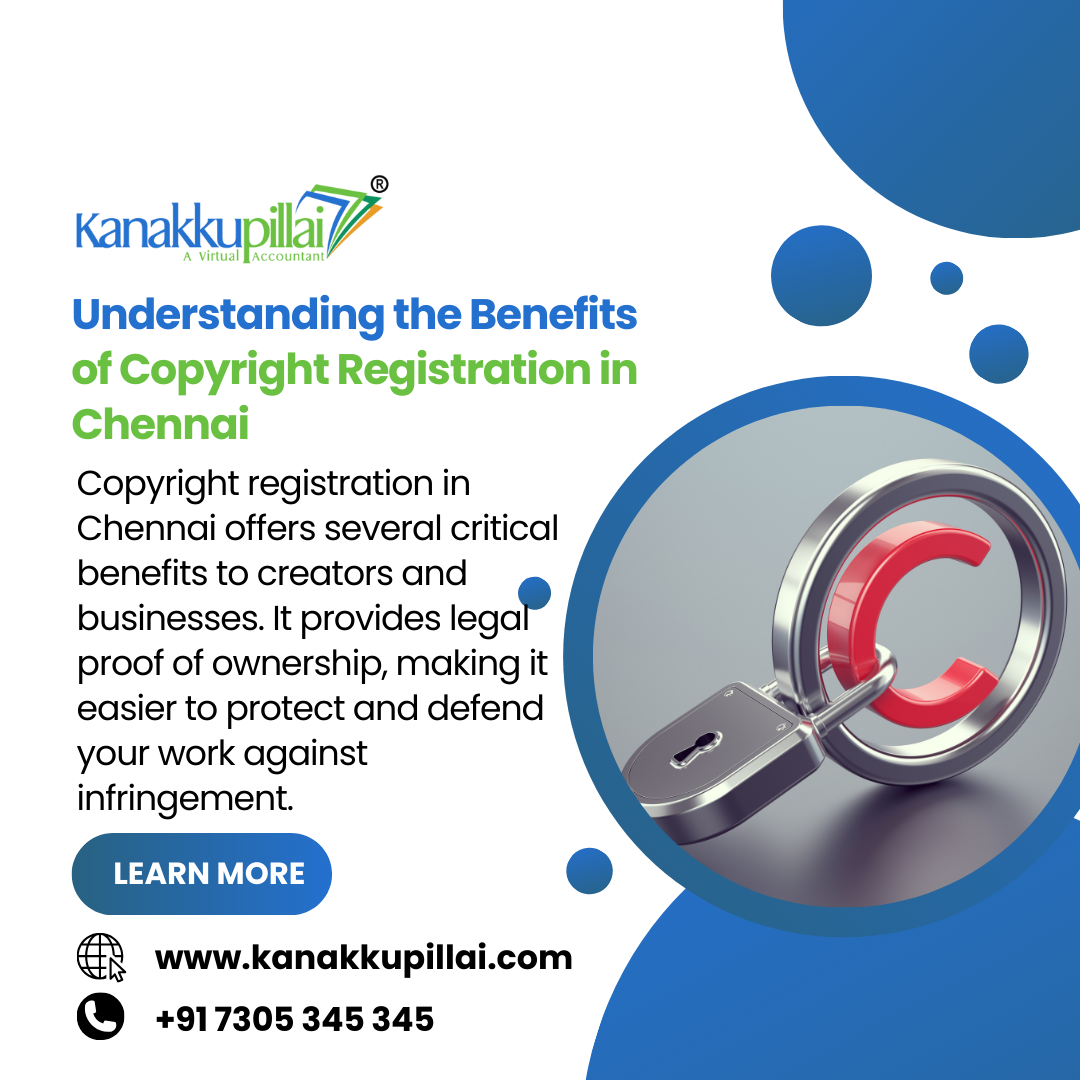Introduction
Copyright registration is a crucial aspect of protecting creative works in Chennai's vibrant cultural landscape. As the city continues to thrive as a hub for music, literature, and art, understanding the benefits of Copyright Registration in Chennai becomes essential for creators. This blog post explores the various advantages of copyright registration, the process involved, and its significance in safeguarding intellectual property.
Definition and Importance
Copyright is a legal framework that grants creators exclusive rights to their original works, including literary, musical, and artistic creations. The primary purpose of copyright is to protect the creator's rights while encouraging creativity and innovation. By securing these rights, copyright ensures that creators can control how their works are used and distributed.
Types of Works Protected by Copyright
Copyright protection extends to a variety of works, including:
- Literary Works: Books, articles, poems, and scripts.
- Musical Works: Songs, compositions, and sound recordings.
- Artistic Works: Paintings, sculptures, photographs, and films.
- Software: Computer programs and applications.
The Process of Copyright Registration in Chennai
Steps to Register Copyright
The process for Copyright Registration in Chennai involves several steps:
- Application Preparation: Creators must gather all necessary materials related to their work.
- Filing the Application: Submit the application form along with a copy of the work to the Copyright Office.
- Examination: The application is reviewed to ensure compliance with legal requirements.
- Issuance of Certificate: Upon approval, a registration certificate is issued.
Duration of Registration
The entire process typically takes 2 to 3 months. Once registered, copyright protection lasts for the creator's lifetime plus an additional 60 years.
Benefits of Copyright Registration
Legal Protection
One of the most significant benefits of copyright registration is the legal protection it provides. Registered works are protected under Indian copyright law, allowing creators to take legal action against unauthorized use or infringement. This legal backing serves as a deterrent against potential infringers.
Evidence of Ownership
A registered copyright serves as prima facie evidence of ownership in case of disputes. This means that if a conflict arises regarding the ownership or use of a work, having a registration certificate simplifies the process of proving ownership in court.
Enhanced Marketability
Registered copyrights can enhance the marketability of creative works. When potential buyers or licensees see that a job is registered, they may be more inclined to engage with the creator for licensing agreements or collaborations. This can lead to increased revenue opportunities for artists and writers.
Ability to License Works
Copyright registration allows creators to license their works for various uses, such as film adaptations or commercial advertising. Licensing agreements can provide substantial income streams while retaining ownership rights over the original work.
Protection Against Infringement
With copyright registration, creators have more substantial grounds for pursuing legal action against those who infringe on their rights. This includes unauthorized reproductions, public performances without permission, or distribution without consent.
Challenges Faced by Creators Without Registration
Vulnerability to Infringement
Creators who do not register their works are more vulnerable to infringement. With registration, it can be easier to prove ownership if someone else uses their work without permission.
Limited Legal Recourse
Infringement cases can become complicated without registered copyright status. Creators who cannot provide evidence of ownership may need help enforcing their rights or seeking damages.
Missed Opportunities for Monetization
With proper registration, creators can experience active opportunities to license or sell their works. Many companies prefer working with registered creators due to reduced legal risks.
The Role of Technology in Copyright Protection
Digital Rights Management (DRM)
In today's digital age, technology plays an essential role in protecting copyrighted material. Digital Rights Management (DRM) technologies help control access and usage of digital content. By implementing DRM solutions, creators can prevent unauthorized copying and distribution of their works online.
Online Monitoring Tools
Several online tools allow creators to monitor the use of their works across various platforms. These tools can help identify unauthorized use and facilitate prompt action against infringers.
Future Trends in Copyright Registration
Evolving Legal Frameworks
As technology continues to evolve, copyright laws will too. Future trends may include:
- Stronger Protections for Digital Content: Enhanced regulations specifically targeting digital content protection.
- Global Harmonization: Efforts towards aligning copyright laws internationally to facilitate easier enforcement across borders.
Increased Awareness Among Creators
Raising awareness about the importance of copyright registration among creators will empower them to protect their rights effectively. Educational initiatives can help demystify the registration process and highlight its benefits.
Conclusion
Understanding the benefits of Copyright Registration in Chennai is vital for any creator looking to safeguard their intellectual property effectively. From providing legal protection and evidence of ownership to enhancing marketability and enabling licensing opportunities, copyright registration offers numerous advantages that cannot be overlooked.
As Chennai continues to flourish as a centre for creativity and innovation, embracing copyright registration will empower artists and writers alike to thrive in this dynamic environment. By taking proactive steps towards protecting their works through registration, creators can focus on what they do best—creating exceptional art that enriches our cultural landscape.





Comments